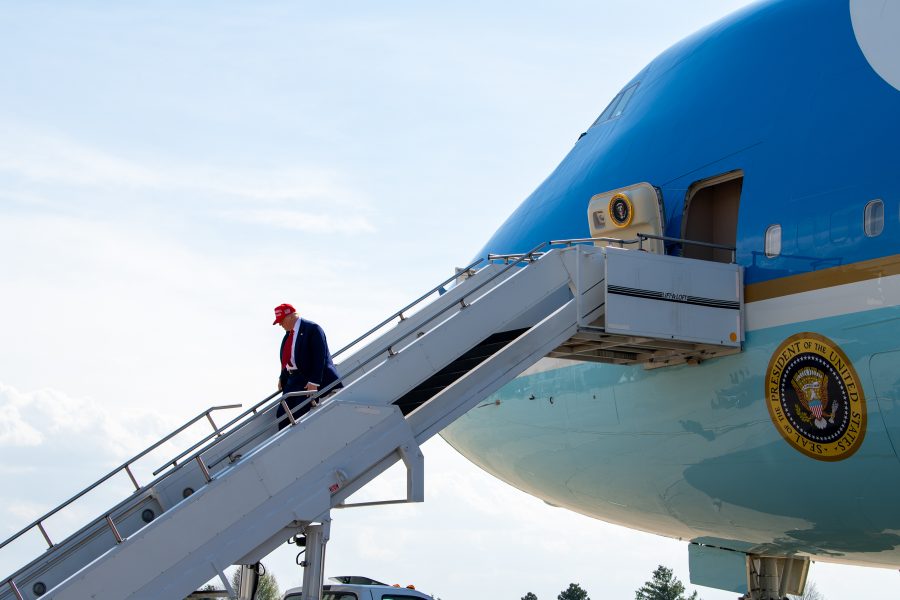Defense Secretary Pete Hegseth has accepted a Boeing 747-8 jet from Qatar that President Donald Trump plans to use as Air Force One, the Pentagon said May 21.
“The Department of Defense will work to ensure proper security measures and functional-mission requirements are considered for an aircraft used to transport the President of the United States,” Chief Pentagon Spokesman Sean Parnell said in a statement.
Parnell referred further questions to the Air Force. A spokesperson told Air & Space Forces Magazine the service will award a contract to convert the former Qatari royal plane, offered as a gift to Trump earlier this month, to serve the needs of the U.S. commander in chief.
It is unclear what the aircraft needs to transform into a flying White House and how the Qatari jet may differ from the current VC-25A presidential airlift fleet, called Air Force One when the chief executive is aboard, or its planned replacement, known as the VC-25B in military parlance. The Air Force declined to provide further details about the plans for the aircraft, citing classification and security concerns.
Before the transfer was announced, Air Force Secretary Troy E. Meink and Chief of Staff Gen. David W. Allvin told Congress May 20 that they were already preparing to modify the Qatari aircraft.
“As we lay out the plan, we will make sure that we do what’s necessary to ensure the aircraft is fit to carry the president with all the communications, safety, and self-defense measures required,” Meink told the Senate Armed Services Committee. The cost of modifying the jet is expected to be significant and could take years to complete, though officials have not revealed any specifics.
Meink said he would be “quite clear” with Trump and Hegseth if the gifted jet poses “any threats that that we are unable to address.”
Lawmakers and government watchdogs have raised ethical and legal concerns about the military’s decision to accept a free plane from a foreign country. News reports have suggested Trump wants to use the jet after he leaves office by having it donated to his presidential library. If new, the custom 747-8 would be valued at up to $400 million.
“Trump must seek Congress’ consent to take this $300 million gift from Qatar,” Rep. Jamie Raskin (D-Md.) wrote on X May 11. “The Constitution is perfectly clear: no present ‘of any kind whatever’ from a foreign state without congressional permission. A gift you use for four years and then deposit in your library is still a gift (and a grift).”
Rhode Island Sen. Jack Reed, the top Democrat on the Senate Armed Services Committee, called the decision to accept the jet a “national embarrassment” in a May 21 statement.
“President Trump is outsourcing a core symbol of American sovereignty, power, and ingenuity,” Reed said. “He is forcing U.S. taxpayers to shell out potentially hundreds of millions of dollars to refurbish this so-called gift which will likely only be in official service for a short time.”
He argued that using the Qatari 747 is “reckless and would create unacceptable vulnerabilities for our nation.”
“There must be transparency and accountability about the costs of retrofitting this plane, the counterintelligence risks involved, and how it will be used once President Trump leaves office,” Reed said.
Boeing is already under contract to modify two unused 747-8s to ferry the president around the world. Meink said he’s unaware of any changes in requirements for the VC-25B program, the Air Force’s effort to replace the modified 747-200s that have served as Air Force One since the early 1990s.
Trump has expressed frustration with that program’s delays and has pushed for ways to receive a new plane sooner. Boeing was initially supposed to deliver the VC-25B in 2024 under a 2018 contract, but estimates for its introduction slipped to 2029, when Trump will no longer be in office. Boeing has incurred more than $2 billion in losses on the project and has cited labor shortages, especially among workers with security clearances, and supply chain issues as the cause of the delays. The Qatari plane has largely sat idle for years.
After public pressure from Trump, the Air Force now says it may be able to get the two Boeing-modified jets in service by 2027, though it has insisted it is not relaxing security requirements to do so. It has not offered a public timeline for modifying the Qatari 747.
